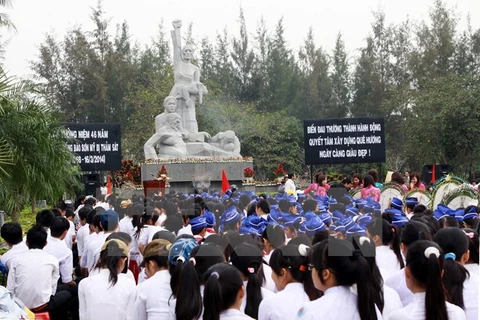Quang Ngai (VNA) - A book, written by one of only a dozen survivors of the 1968 My Lai massacre, was published on the 48th anniversary of the infamous incident.
Pham Thanh Cong, the 58-year-old director of the Son My Vestige site management board in the central Quang Ngai Province's Son Tinh District, authored the book, entitled The Witness from PinkVille. Cong said the 248-page book recalled the events in the village (now in Tinh Khe Commune) nearly half a century ago.
He said 2,000 copies of the book, of which 1,000 are in English, will be available at the Son My Vestige site on the 48th anniversary of the massacre on March 16.
Cong said the massacre was the worst tragedy that he witnessed at the age of 11, when his mother and six brothers were killed by American soldiers in their house. He was seriously injured but was eventually saved by his father.
American soldiers killed 504 unarmed civilians in the massacre.
"I lost my father in 1970 and became homeless and an orphan," Cong said.
"I wanted to release a book on the massacre as a historical document for future generations about the cruel killing of villagers and the American War."
On the book's cover, he wrote, "The course of history ever flows on. None could stand in the same current forever, yet none has the right to jump out of it or forget it."
Kristen Roy, 24, the daughter of an American veteran, left a message in the visitors' book during a visit to the site, and the message has been reprinted on the book's back cover.
Roy wrote, "As a daughter of an American veteran, I have always been curious of the certain mystery deep in my father about Vietnam. I cannot say I fully understand this and I never will, but in my past few weeks in Vietnam I have to come to a closer understanding of my father and his fellow veterans, as well as of the beautiful people of Vietnam and their strength as well. Let this bridge of understanding continue to grow and be stronger, as I will do my part in my life to make sure the understanding is never again broken."
The book has four chapters, comprising an ‘introduction of the village', ‘the morning of the massacre', ‘parentless days' and ‘the sunrise of the village'.
The Son My Vestige site, located 8km from Quang Ngai City, attracts about 250,000 visitors annually, of which 50,000 are foreigners.
Cong said Roy Mike Boehm, who came to Vietnam in 1968 as a soldier to fight in the Cu Chi battlefield on the outskirts of Sai Gon (Ho Chi Minh City today), would come to play his violin on the 48th anniversary as he has been doing for years.
Boehm now visits the country as a healer of the wounds that the war has given to Quang Ngai Province.
Over the past 20 years, Madison Quakes, Inc, (MQI), a non-governmental organisation that Boehm founded, has raised more than a million USD to fund many humanitarian projects that help poor women, farmers and victims of Agent Orange in the province.
Over the past 25 years, Boehm has also visited Son My Memorial frequently, where he plays his violin to pray for the souls of the massacre victims and to send out a message of peace.
He still calls out to other American war veterans to visit Vietnam to bridge and promote the relationship between the country and its international friends to alleviate the pain of war.
The killings that occurred on March 16, 1968 in the South Vietnamese hamlet of My Lai prompted widespread outrage around the world. The massacre is also credited with advancing the end of the American War because it significantly undermined public support in the United States for the war effort.
The massacre began when men of Charlie Company, under the command of Lieutenant Calley, opened fire on civilians during a ‘search and destroy' mission in My Lai and neighbouring villages. The victims of the killings were mainly old men, women and children, all unarmed, as most of the young men of the community were working in the fields at the time.-VNA





















